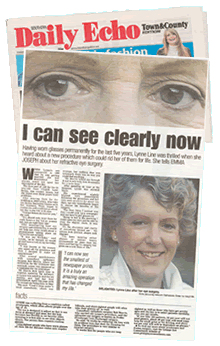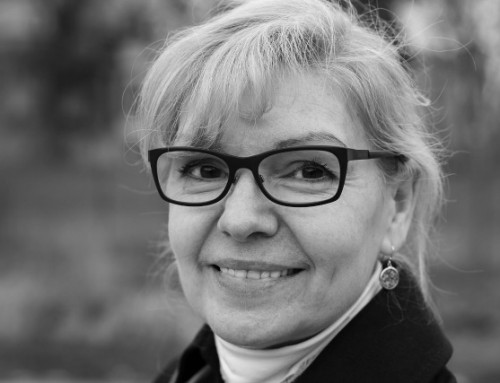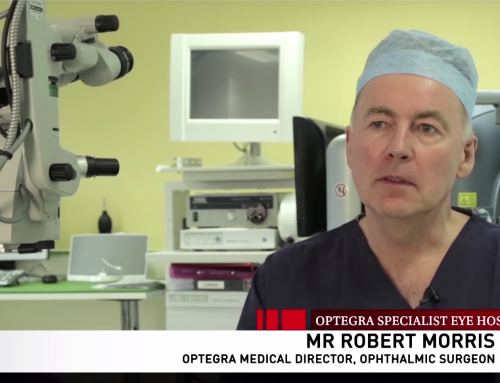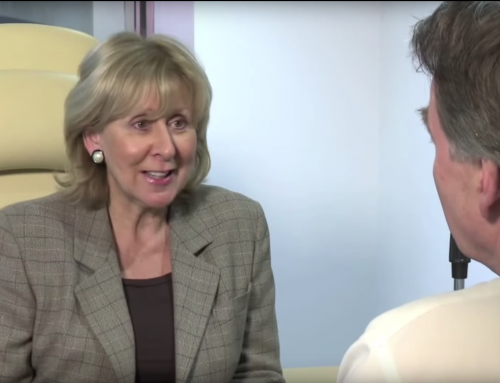 I can see clearly now
I can see clearly now
Having worn glasses permanently for the last five years, Lynne Line was thrilled when she heard about
a new procedure which could rid her of them for life. She tells EMMA JOSEPH about her refractive eye surgery.
When Lynne’s son announced in 1999 that he was getting married she was determined her glasses would not spoil her enjoyment of the day.
The first port of call for the 55-year-old from Church Lane, Botley, was contact lenses, but she found even those posed their problems.
After wearing them for the wedding in 2000 Lynne, who runs the Botley Bathroom Centre with her husband Peter, began to realise she still could not go about her day-to-day life with ease.
“Contact lenses do restrict you,” she said. “You should only wear them for eight hours a day, but no woman has just an eight-hour day.”
After investigating laser eye surgery and discovering it would not help her, Peter heard about a presentation taking place on refractive eye surgery.
“It was my birthday,” said Lynne, “so he thought we would go and have a look as my birthday present. I was known as the woman who asked all the questions and then I decided to make an appointment.”
After several appointments with Consultant Ophthalmic Surgeon Rob Morris, where her suitability for the treatment was assessed, Lynne was approved as a candidate for the procedure.
Mr Morris then spent time in America updating the software, so Lynne was asked to wait for six months and had her first procedure in April this year, with the second eye being done in May.
She said: “I had it done under a local anaesthetic, which was strange, but nothing that was untoward, there was no way you could feel anything.
“Mr Morris talked me through it and it only took 15 to 20 minutes for it to be done.”
After spending an hour at the hospital, Lynne was allowed home.
She experienced slightly blurred eyes immediately following the procedure and her eyes were sensitive for about two days, but she immediately began to realise the benefits of surgery.
“The first thing I noticed was that I could pick up a newspaper and not have to put glasses on.
“Being in bed in the morning I could open my eyes and be able to read the digital clock. It was brilliant.
“It’s the sharpness and clarity of everything around me – the greens look greened, shapes look sharper.
“I’ve been wearing either glasses or contact lenses permanently for more than ten years and having the surgery has given me a new lease of life.”
‘I can now see the smallest of newspaper prints. It is a truly amazing operation that has changed my life.’
FACTS
- LYNNE was suffering from a condition called presbyopia, which often affects people over the age of 45.
- The eye is designed to adjust so that it can focus at distance and near, but the lens becomes less flexible as we become older, meaning it is less able to see close objects clearly. The person then requires reading glasses.
- Long-sighted people who have worn glasses all their life for distance vision now require bifocals, and short-sighted people will often take their glasses off to read.
Consultant Ophthalmic Surgeon Rob Morris, who carried out Lynne’s procedure, said the refractive eye surgery is known as PRELEX (Presbyopic Lens Exchange) surgery.
He said: “It works by replacing the lens with an artificial lens that does the focusing for them. The procedure is very similar to cataract surgery.
“It works best for people who are long-sighted as well as those who have got presbyopia and the key is to select patients carefully, then you get results.
“If you take 100 patients, 60 per cent will not need glasses, about 30 per cent will need some help for small print or for driving, and about ten per cent will still be dependent on glasses.”
SOUTHERN DAILY ECHO – OCTOBER 2003




